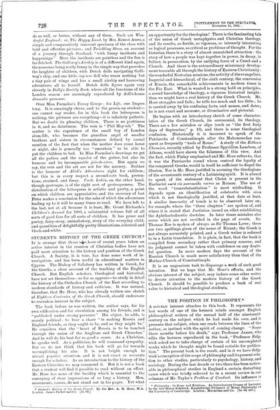STUDENT'S HISTORY OF THE GREEK CHURCH.* IT is strange that
those 14o have of recent years taken an active interest in the reunion of Christian bodies have not paid more attention to the history and position of the Greek Church. A Society, it is true, has done some work of in- vestigation, and has been useful in educational matters in Cyprus. The Bishop of Salisbury has written in Greek, for the Greeks, a clear account of the teaching of the English Church. But English scholars, theological and historical, have not set themselves—so far as appears—to study in detail the history of the Orthodox Church of the East according to modern standards of history and criticism. It was natural, therefore, that Mr. Hore, who has already written one sketch of Eighteen Centuries of the Greek Church, should endeavour to reawaken interest in the subject.
The book before us was written, the author says, for his own edification and for circulation among his friends, and is "published under strong pressure." His object., he adds, is mainly political : to bear a share " in making Russia and England friends, as they ought to be, and as they might be." He considers that the " heart of Russia is to be touched through the union of the Anglican and Greek Churches." And he will do his best for so good a cause. As a Christian, he speaks well. As a politician, he will command sympathy. But we do not think that his book will go far towards accomplishing his aim. It is not bright enough to attract popular attention, and it is not exact or accurate enough for scholars. As an introduction to the history of the Eastern Churches we may commend it. But it is not a book that a student will find it possible to read without an effort. Mr. Hoye has none of the lucidity which is essential to the conveying of clear impressions of so long a history. Men, movements, "causes, do not stand out in his pages. Yet what • Student's History of the Greek Church. By the Bey. A. H. More, M.A. London James Parker and Co. [7s. Gd.] an opportunity for the theologian ! There is the fascinating tale of the union of Greek metaphysics and Christian theology,
and its results, so fertile, so vigorous, so intensely interesting as logical processes, so critical as problems of thought. For the historian there is a story of almost unmatched attraction: the story of how a people was kept together in power, in decay, in failure, in persecution, by the unifying force of a Creed and a Church. And there is the extraordinary missionary develop- ment traceable all through the history of Eastern Christianity : the wonderful Nestorian missions, the activity of the evangelists, Imperial and hierarchical, of the sixth century, the conversion of Russia, the remarkable achievements in modern times in the Fir East. What is wanted is a strong hold on principles, a sound knowledge of theology, a vigorous historical insight : then we might have a real history of the Greek Church. Mr. Hoye struggles and fails ; he tells too much and too little ; he is carried away by his confusing facts, and names, and dates; he is not exact and accurate, or illuminative and pictorial.
He begins with an introductory sketch of some character. istics of the Greek Church, its ceremonial, its theology. There are a few mistakes or slips (such as "the first forty days of September," p. 13), and there is some theological confusion. Historically it is incorrect to speak of the Patriarchs of Constantinople after the Mahommedan con- quest as frequently " tools of Rome." A study of the Ecthesis Chronica, recently edited by. Professor Spyridion Lambros, of Athens, would have shown the falseness of this view. And the fact, which Finlay emphasised and Mr. Hoye refers to, that it was the Patriarchs round whom centred the loyalty of the conquered Greeks, would in itself .be sufficient to dispel the illusion. Nor is Mr. Hoye justified in accusing the theologians of the seventeenth century of a Latinising spirit. It is absurd to speak. of the statement that Christ is present in the Eucharist 74C4Tei TOY IMITYlpilan zpOroy as Roman. The use of the word " transubstantiation " is most misleading. It depends upon an identification of substantia with oimict which is not theologically justified, at that date at least. A similar insecurity of touch is to be observed later on ; for example, where the "three chapters " are spoken of, and where it is stated that Justinian issued an edict establishing. the Aphthartodocetic doctrine. In later times mistakes also occur which are not rectified in the page of errata. Sir Thomas Roe is spoken of always as Sir Thomas Lowe ; there are two spellings given of the name of Ricaut ; the Greek is not always accurately printed, and a Greek writer is referred to in a Latin translation. It is plain, in fact, that the book is compiled from secondary rather than primary sources; and its judgment cannot be taken with confidence on any doubt- ful question. In more modern days the account of the Russian Church is much more satisfactory than that of the Mother-Church of Constantinople.
It is an ungracious task to disparage a work of such good intention. But we hope that Mr. Hore's efforts, and the obvious interest of the subject, may induce some other writer to devote attention to the modern history of the Greek Church. It should be possible to produce a book of real value to historical and theological students.






















































 Previous page
Previous page